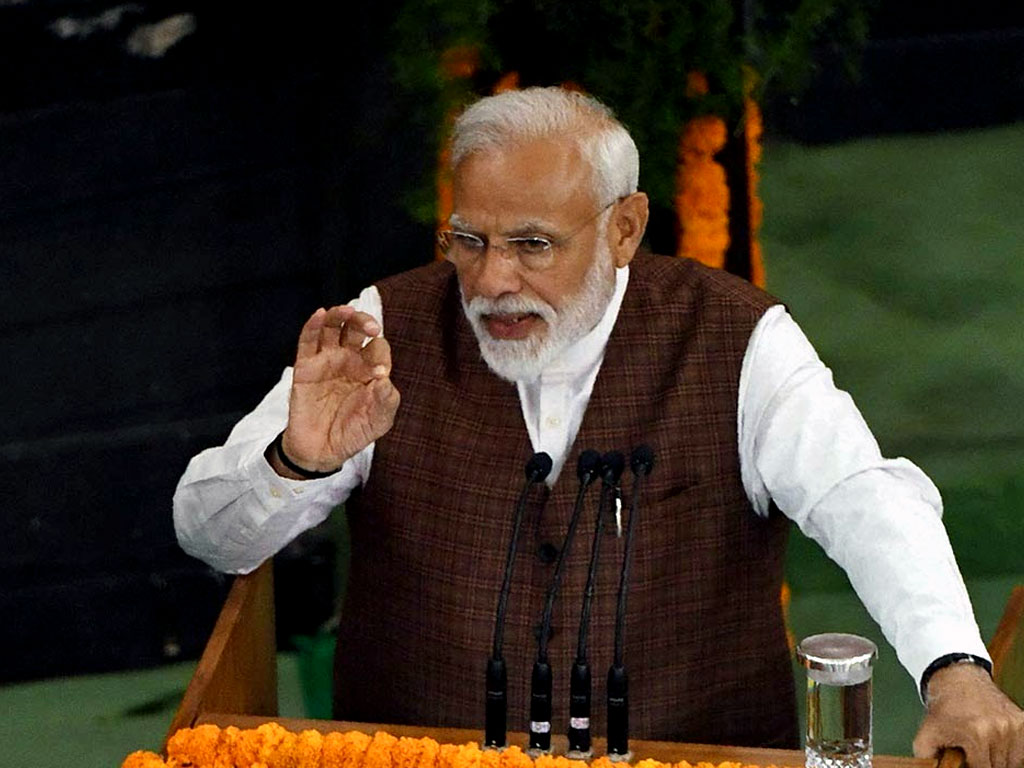Modi says will strive for sabka vishwas

Prime Minister Narendra Modi was expected to win this general election and he has won - and with quite a few potential firsts that would not only help India shed disguise of secularism but also sharpen its appetite for regional predominance. Last time, he had promised prosperous economic growth - for which his predecessor Manmohan Singh had laid a strong foundation - but couldn't deliver on that. But now it was his hark for revival of mythical Hindutva and anti-Pakistan card. Both perfectly jelled with Hindu majority whose mindset was excessively influenced by the BJP's parent RSS. "Majority is priority" was the BJP's call and it got the massive vote. BJP's Sadvi Pragya, who defended Mohandas Gandhi's killer Nathuram Godse by describing him as 'patriot', for example, has won from Bhopal. Narendra Modi had the support of not only religious extremists but also of big business, mass and social media and intellectual far right. Secular parties could save only a few states in south and east from the Hindutva tsunami; so much so, that even Congress chief, Rahul Gandhi, was defeated by BJP's Smriti Irani in his family home ground of Amethi in UP. Not that India was secular anytime in the past; it was never secular but the Congress-led leadership had succeeded in projecting India as secular, particularly in the West. That is history now. Narendra Modi and his saffron cohorts have put on display what is real Hindutva; India is a country where there is no place for non-Hindus. Prime Minister Modi may have won another term, but is India likely to be more stable and united than before? No, not at all - the one-fifth non-Hindu Indians are expected to be trying to retrieve what they lost at the hustings. They would defend their religious and cultural identities; for them it is battle for survival and definitely not one-sided anymore.
However across the border, the government and people of Pakistan do see a small chink in that thick dark curtain allowing a ray of hope that a strong and self-assured Modi government may now think of returning to the table for peace talks. Given the criticality of issues and problems besetting Pakistan-India bilateralism Prime Minister Modi had not done before what he can now. Prime Minister Imran Khan had wondered "perhaps if the BJP wins, some kind of settlement in Kashmir could be reached." No wonder then he was one who took no time to congratulate a re-elected Modi, conveying "hope to work with him for peace". Modi responded with some warmth, thanking him for his good wishes. Also interestingly, a day before, on the sidelines of Shanghai Cooperation Organisation meeting in Bishkek, Indian Foreign Minister Sushma Swaraj had an informal meeting with her Pakistani counterpart Shah Mahmud Qureshi. Given inbuilt unpredictability entailing the Pakistan-India political and diplomatic encounters one would be naïve to believe that ice is going to melt anytime soon. Of course one sparrow does not make a summer. India tried, albeit unsuccessfully, war on Pakistan. Of course, the Pulwama incident and the so-called surgical strikes on Pakistan did help Narendra Modi win elections. But as he also knows the whole truth in the matter it can be inferred that war on Pakistan is no more an option. Coming to Indian occupied Kashmir; it should be no more a discovery for Prime Minister Modi that people of Kashmir have resolutely resisted Indian occupation, boycotted the elections and rejected his plan to end the special status the Held Kashmir enjoys under the India's constitution.
In the 'New India' the Modi administration shall have to coexist with three realities - one, war with Pakistan cannot be won; two, the Kashmiris' self-determination is inevitable; three, further alienation of non-Hindu minorities will seriously undermine India's socio-political harmony and territorial integrity. In fact, the electoral victory has brought Prime Minister Modi to the fork - he is to decide whether to take the road to a peaceful and prosperous India or raise the ante of violence within and without. Be that as it may, it is heartening to note that Modi, while addressing members of the National Democratic Alliance (NDA) after victory, has said: "We have worked for sabka saath, sabka vikas, now we have to strive for sabka vishwas."























Comments
Comments are closed.